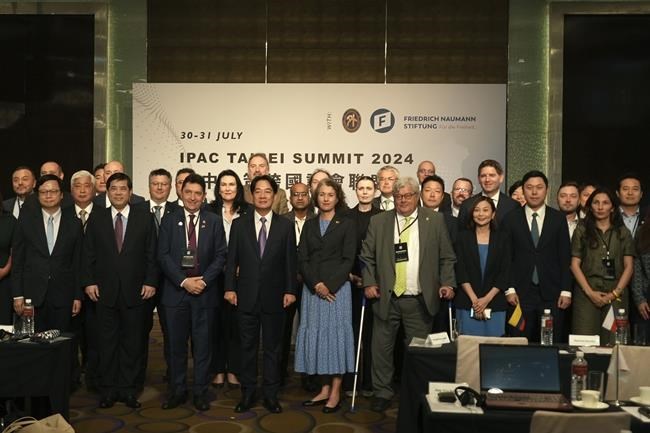
Taiwanese President Lai Ching-te, center left, poses for photos at a gathering of the largest delegation of foreign lawmakers to visit Taiwan in Taipei, Taiwan Tuesday, July 30, 2024. The delegation by the Inter-Parliamentary Alliance on China, or IPAC, is a group of hundreds of lawmakers from 35 countries concerned about how democracies approach Beijing. Lai told attendees that their participation showed the importance of democratic unity, even as Beijing put pressure on lawmakers not to attend the conference. (AP Photo/Dake Kang)
Republished July 30, 2024 - 1:56 AM
Original Publication Date July 29, 2024 - 11:51 PM
TAIPEI, Taiwan (AP) — Taiwanese President Lai Ching-te welcomed what he called the “largest-ever” delegation of foreign lawmakers to Taiwan and said Tuesday it showed the importance of democracies uniting, even as Beijing pressured members of the delegation not to visit.
“This demonstrates the support and the value various other countries place on Taiwan,” Lai said. “It also sends an important message to democratic countries around the world. Maintaining democracy requires unity, and we must protect democracy together."
Lai made his remarks at a conference in Taipei held by the Inter-Parliamentary Alliance on China, a group of hundreds of lawmakers from 35 countries concerned about how democracies approach Beijing.
Beijing views the self-governed island democracy as part of its territory and has been upping its threats to annex it by force if necessary. Lai’s party, the Democratic Progressive Party, doesn’t seek independence from China because he believes that Taiwan is already a sovereign nation.
Beijing sees Lai as a separatist and refuses to speak with him. China has ramped up pressure against the island since Lai took office in May, sending ships and planes on a large military drill to show displeasure at his inauguration. That comes after years of Beijing's pressure on Taiwan — which has been ruled by the DPP for three terms now — on diplomatic, military and economic fronts.
Lai said at the conference that Taiwan would work with other democracies to protect democracy from "the threat of authoritarian expansionism.”
“China’s threat to any country is a threat to the whole world,” Lai told conference participants. China “uses diplomatic kidnapping, economic coercion, internet attacks, and spreading false and fake things to continuously muddle matters and seek to undermine regional peace and stability.”
Lai’s comments come as IPAC is under renewed scrutiny from Beijing. Lawmakers from at least six countries told The AP earlier this week that Chinese diplomats were pressuring them not to attend the conference, in what they described as efforts to isolate the self-governed island.
IPAC has long been despised by the Chinese government: Some members have been sanctioned by Beijing, and in 2021 the group was targeted by Chinese state-sponsored hackers, according to a U.S. indictment unsealed earlier this year.
In a written statement, the Chinese Foreign Ministry said IPAC “has no credibility at all” and repeated its stance that Taiwan is part of Chinese territory.
“China firmly opposes any form of official exchanges between countries with diplomatic ties with China and the Taiwan authorities,” the statement said.
Lai, also known by his English name William, is reviled by Beijing for his staunch opposition to political unification with the mainland. Earlier in his career, Lai said he was a "pragmatic worker for Taiwan independence,” but has since softened his rhetoric, saying he supports maintaining the status quo across the Taiwan Strait.
Beijing prevents countries it has diplomatic relations with from having formal ties with Taipei. China has been peeling off the island’s diplomatic allies, often with promises of development aid, in a long-running competition between the two that has swung in Beijing’s favor in recent years. The Pacific Island nation of Nauru switched recognition to Beijing earlier this year, a move that reduced Taiwan’s dwindling number of diplomatic allies to 12.
Since Lai took office in May, tensions have continued to simmer in the region.
The U.S. has been aiding in the upgrading of Taiwan’s equipment and training, with the U.S. State Department approving the sale to Taiwan of missiles and drones for an estimated $360 million last month. In April, the House of Representatives approved an $8 billion military aid package for Taiwan.
In late June, Beijing's top court issued guidance saying the death penalty could be used against “hardcore” Taiwan independence supporters. In response, Taipei urged its citizens to avoid traveling to China and the semi-autonomous Chinese territories of Hong Kong and Macao.
Top diplomats from the U.S., Japan, India and Australia met in Tokyo this week to discuss security issues in the Indo-Pacific region, shortly after the U.S. and Japan held their “2+2” security meeting Sunday, where they called China “the greatest strategic challenge.”
High on the agenda were Taiwan and cross-strait relations. Beijing’s escalating assertiveness in the South China Sea has triggered tensions with many neighbors, adding to fears of a confrontation.
Lai has vowed to continue maintaining stability with China while beefing up Taiwan’s security by importing military equipment, expanding its defense industry, and reinforcing regional partnerships with unofficial allies such as the U.S., Japan, South Korea and the Philippines.
“We are willing to replace confrontation with dialogue and containment with exchanges under the principles of reciprocity and dignity,” Lai told participants. “We will communicate with China to reduce conflicts and achieve peace and stability in the Taiwan Strait.”
___
Associated Press journalist Johnson Lai contributed to this report.
News from © The Associated Press, 2024